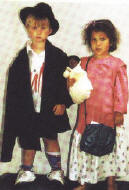|
|
|
|
| Children need families .. there is no adequate substitute for the
love of your own mother and your own father. Sometimes families run into problems. Young
parents can lack the expertise and knowledge to meet their children’s needs,
especially if they did not have that all important love and attention when they were
growing up. Unemployment, poverty and poor housing can put stresses on a family. Family breakdown might follow child abuse or domestic violence which may have been preventable. Drinking, gambling or emotional and mental illness can make it impossible for a family to cope without help. We provide that help to families in crisis, families which have broken down and to parents and children whose lives are falling apart. Why work with families? When children are emotionally disturbed by family stresses or when mothers find it hard to cope and care for a child - one answer is to provide alternative care, to take the child out of the family. But working with the child alone is only seeing part of the problem. Children cannot be cared for in isolation - mothers and fathers need to be supported and helped to build their parenting skills - We provide a community based package of support under the umbrella of which, families can learn together how to live happily and securely. We are able to perform intensive assessment, family rehabilitation treatment and follow up ensuring continued support.
Case histories - examples of treatment programmes- The Carter family had been separated. Both parents were alcoholic and had marital problems. The twelve year old son was depressed and not coping at school. The baby had been removed to a children’s home for failing to thrive. Their residential care involved an intensive alcohol treatment programme, individual therapy for the parents and older child, couples sessions to work on the marriage and family sessions to work on family roles and relationships. Remedial education and assessment was provided for the son and the baby’s developmental progress was monitored and assisted in play therapy time. With the family working together in a stable nurturing environment the child’s developmental scales improved dramatically from a developmental quotient of 75 on admission to 95 three months later. The Lang family - a sad young family where mother and father married at 16 and had two children very soon afterwards. She had an eating disorder and was very depressed. Admission followed an incident of near infanticide. The family were rehabilitated in a very structured and supportive programme. Parents were helped to understand family stresses and bulimia for which a specific programme was drawn up. Sandra - had problems coping with a toddler and young baby. She had ambivalent feelings towards their father and a very low opinion of herself. When depressed she harmed herself. She had been sexually abused by her deceased father. Treatment centred on her own unresolved feelings and abuse while supporting and rebuilding the family structure. |
 Youth Support
Youth Support
Assessment & Services


